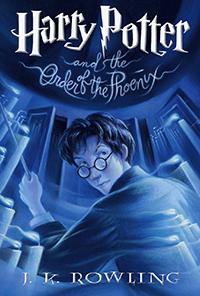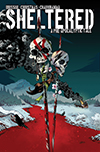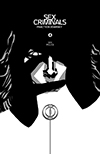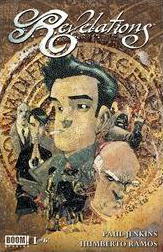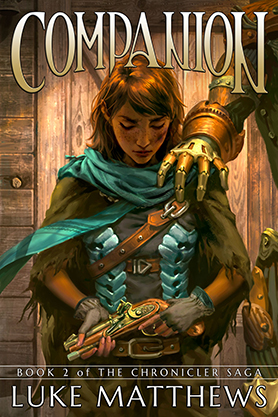I’ve read a lot of blog posts and stories from authors about their journey with writing and the things that led to them becoming a full-time writer. Many of these are couched in the guise of writing advice, seeming attempts to latch onto the same anecdotal feel as one of my favorite writing books, Stephen King’s On Writing.
The stories I’ve read are almost universal in their portrayal of depression, self-loathing, and tenacity in the face of overwhelming odds. As the social media/blogosphere has opened up unprecedented access to the thoughts of our favorite authors, aspiring writers are further besieged by tales of financial hardship and mental degradation.
Don’t take this to mean I’m discounting these stories, saying they’re untrue, or even saying they’re not an accurate portrayal of the average writer’s tribulations. I’m just taken aback by a couple of things: first, how different my path to writing has been from most of the stories I’ve read, and second, the alarming detail with which most writers remember their past.
 I don’t remember the first thing I ever wrote. I’m always surprised by the stories of other writers, who can remember with perfect clarity every piece that’s ever come off of their pen or keyboard, and can identify the exact moment in their life that fired their desire to be a writer.
I don’t remember the first thing I ever wrote. I’m always surprised by the stories of other writers, who can remember with perfect clarity every piece that’s ever come off of their pen or keyboard, and can identify the exact moment in their life that fired their desire to be a writer.
My long-term memory has always been shit. With the exception of a few specific, turn-key moments, my childhood is just a giant blur. I have looked at pictures from my childhood – of my family on road trips, of meeting family friends, of birthdays – and don’t remember any of the events depicted there. There are pictures of my brother and I at Bedrock City – an old Flintstones-themed park in Custer, South Dakota – from the early 80’s that I have no recollection of. Disneyland barely registers in a foggy haze of disconnected images.
So trying to remember the first thing I ever wrote isn’t just a chore, it’s likely impossible. I’m not sure how important it is, though. If I can’t remember the first thing I wrote, then it probably doesn’t have much influence on my current writing life.
 Writing has always been a background thing for me. I’ve always been a storyteller (just ask my wife how many times she’s heard the same story of something-or-other), but until recently it was never something I actively *did*. I know that there was writing for many classes throughout high school, but I couldn’t tell you what any of those stories were about.
Writing has always been a background thing for me. I’ve always been a storyteller (just ask my wife how many times she’s heard the same story of something-or-other), but until recently it was never something I actively *did*. I know that there was writing for many classes throughout high school, but I couldn’t tell you what any of those stories were about.
In high-school, I was way more interested in being an artist. I was always drawing. If it wasn’t doodles in my notebooks during class I was practicing techniques to become a comic book artist. I’ve always been into comics, and at one point thought that was a field I’d enter as an artist. My first attempts to get published took the form of comic book pages.
There was a small – and I mean very small – local press in Bend that created small print-runs of anthology comic books that were hand-delivered to the local Oregon comic shops on a bi-monthly basis. I had met the guy who ran the press a few times and, after showing him some of my art, he agreed to publish a 3-4 page story of mine in one of his books. After churning out a terrible 3-page faux-trailer for a 90’s Image gun-toting super-hero, I handed over the pages for the next issue.
He never produced another issue.
Along the same line, I wrote and drew an eight-page story that ended up in a collection of writing and art that was given to students at my high school. Wow, is it bad. The title character’s name is an acronym spelling F.I.R.E.A.R.M. – because, you know, he has a plasma gun for an arm, ala Mega Man. I’m not even going to talk about what that acronym stands for. The story included the line “The killing has become too easy. Living has become too hard.”
Deep.
I was way behind deadline on it and never inked the pages, but the penciled and lettered pages are forever immortalized in a spiral-bound, title-less collection that most of my high-school classmates have probably thrown away by now. I might still have a copy lying around. Maybe.
 After high school, I thought I knew what I wanted to do. I moved to Seattle and spent 2½ years at the Art Institute working on a computer animation degree that never materialized into anything. I got an internship-turned-full-time-position at Wizards of the Coast, where I was constantly surrounded by writers and artists more talented and interesting than me.
After high school, I thought I knew what I wanted to do. I moved to Seattle and spent 2½ years at the Art Institute working on a computer animation degree that never materialized into anything. I got an internship-turned-full-time-position at Wizards of the Coast, where I was constantly surrounded by writers and artists more talented and interesting than me.
I would like to say that I never allowed that to discourage me, but upon reflection I realize that’s not the case. For a lot of people that discouragement would’ve been front-and-center in their psyche – the sort of thing that leads one to write a blog post about depression and self-loathing. For me, it was more subtle.
The Art Institute had already burned me out on one creative path in my life, so the creative talent at WotC didn’t inspire me as it would others, instead it just pushed my ideas to the background. I subconsciously allowed myself to set those things aside without a fight, and most of my creative pursuits just faded out of my life.
But I was still writing. I was active in a live-action roleplaying game at the time, and had been using that as an outlet. It’s something I’d been doing long before I started at WotC, but somewhere on the internet there are e-mail groups with post upon post of in-game fiction that I was writing about the characters I and my friends were portraying in the game. Over the course of my time in N.E.R.O., Legacies, and Amtgard, I can’t even calculate the output of shared stories I worked on to help fill in the gaps between meetings.
My first real attempt at a novel is an aborted 25,000 words toward an epic fantasy story based on the characters from Amtgard. Of all the things that I’ve written, I would probably credit that story as the spark that made me want to write more seriously.
 Sometimes I wonder if my lack of depression or notable mental illness is something that hinders my credibility as a writer. So many authors, of varying degrees of fame, tell those stories and identify their experiences with mental illness as informative of their writing. It’s a widely held belief that authors are prone to emotional issues and substance abuse, and that – as horrible as those things can be – they can sometimes lead to moments or periods of creative brilliance.
Sometimes I wonder if my lack of depression or notable mental illness is something that hinders my credibility as a writer. So many authors, of varying degrees of fame, tell those stories and identify their experiences with mental illness as informative of their writing. It’s a widely held belief that authors are prone to emotional issues and substance abuse, and that – as horrible as those things can be – they can sometimes lead to moments or periods of creative brilliance.
I don’t really have that. While I have experienced depression in my life, it’s not in the clinical, chronic sense. I get sad when sad things happen and happy when things go right. And while I used to be a pretty cynical person, and I still tend to be a skeptic in a lot of ways, I found a long time ago that I was generally happier living with optimism.
Does that ruin my writer street cred? Writ Cred?
I don’t mean to be glib about other people’s problems. I only find it interesting that because of these kinds of stories from some of the world’s favorite writers, readers tend to automatically associate the term “author” with “depressed, socially awkward alcoholic”, and allow that association to lend some credibility to their artistic output, which I think is bogus.
 I’ve always had ideas in my head for stories. I’ve been a gamer all my life, and have been playing Dungeons & Dragons and other roleplaying games since I was 10… ish (I can’t remember exactly when I started; see above about my memory re: my childhood). Most of my story ideas came out in the form of outlines for gaming sessions, most of which were never run. Some of them morphed into bits and parts of roleplay posts for those live-action games, and some of them just banged around in my head with no purpose or outlet.
I’ve always had ideas in my head for stories. I’ve been a gamer all my life, and have been playing Dungeons & Dragons and other roleplaying games since I was 10… ish (I can’t remember exactly when I started; see above about my memory re: my childhood). Most of my story ideas came out in the form of outlines for gaming sessions, most of which were never run. Some of them morphed into bits and parts of roleplay posts for those live-action games, and some of them just banged around in my head with no purpose or outlet.
Toward the end of my time at WotC, when I was still in the midst of that novel attempt, there was an open call for a new novel based on one of the D&D campaign settings. I’d had this idea for a story swimming around in my brain since college that needed an outlet, so I wrote up a proposal and sent it in as part of the contest. I don’t think I ever even got a rejection letter.
So, that idea still hovered around in my brain, and I just couldn’t get rid of it. And, as life continued to intervene and fuel my utter lack of creative motivation, I wasn’t doing anything to get that idea out of my head. The outlet for it seems so simple, in retrospect.
 After I was laid off from that job, I bounced around a lot and let financial need take over my brain. My wife and I lived pretty broke for a while, and for the next four years or so I floated inside my own head, trying to figure out what I wanted to do next. I had thought to make a career at Wizards, but should’ve known better, and was dumped back into the world, rudderless, at the ripe old age of 23.
After I was laid off from that job, I bounced around a lot and let financial need take over my brain. My wife and I lived pretty broke for a while, and for the next four years or so I floated inside my own head, trying to figure out what I wanted to do next. I had thought to make a career at Wizards, but should’ve known better, and was dumped back into the world, rudderless, at the ripe old age of 23.
A card game that I co-designed was published by Green Ronin Games, but that was about the extent of my creative work. I had a few articles published in the now-defunct Undefeated Magazine (by Pathfinder’s Paizo Publishing), but when that dried up I never pursued that path for writing. It was fun and I made (piddly) money at it, and to this day, I have absolutely no idea why I didn’t go after that.
The natural progression (as my brain told me) was to fall back on my original plan: become an animator. I worked some temp jobs and did some freelance work, but eventually convinced myself that my original path was correct (even though it didn’t pan out) and took a 5-week immersion course at a tiny school called Mesmer Animation Labs. I spent a ridiculous amount of our waning funds on the course and the materials, only to discover a few months after it was over that I had lost interest in an animation career.
I’m very lucky that my wife didn’t murder me.
There are many writers whose story of persistence and tenacity revolves around the idea of always writing, no matter what, and scraping by doing whatever writing they can to make ends meet. That story isn’t my story. The freelance work I was doing was mostly fun, my temp jobs were usually easy, and by the time I’d been a game tester at Nintendo for a while, I didn’t have a lot of reason to go do a shit job for the sake of money.
Testing wasn’t entirely stable, mind you, but it was simple and fun and my co-workers were nerds just like me. I tried working a couple of call-center jobs during my breaks from Nintendo, and couldn’t do it, so I just kept hovering back to testing. It wasn’t what I wanted to do as a career, but at that time I had no fucking clue what I wanted as a career. I just knew this was something I was good at and it made me decent money, so I stayed.
 Once the money situation stabilized, my creative brain started scratching at my skull again. Especially during long periods the utter boredom that is bug testing GameCube games, my ideas would run roughshod over my concentration. I had ideas for short stories, art projects, game designs, you name it. I designed and wrote and entire rulebook for a live-action roleplaying game called Unification, and even went so far as to run it for several months. I designed other card games (none published, yet), wrote some stories, and – eventually – went on to create several podcasts and Geekerific.com.
Once the money situation stabilized, my creative brain started scratching at my skull again. Especially during long periods the utter boredom that is bug testing GameCube games, my ideas would run roughshod over my concentration. I had ideas for short stories, art projects, game designs, you name it. I designed and wrote and entire rulebook for a live-action roleplaying game called Unification, and even went so far as to run it for several months. I designed other card games (none published, yet), wrote some stories, and – eventually – went on to create several podcasts and Geekerific.com.
I’ve spoken before about how the death of my father spurred much of the creative work I started in 2010, beginning with the creation of the After The Fact podcast. That step – using the creation of the podcast and the website to distract me from grief – began a cascading effect with my artistic drive. In the last four years I’ve been more creatively active than in the ten years prior, which led to the conclusion that maybe it was time to bring that to the forefront.
I learned, over the course of 2010, that the only way to get a creative idea to stop waking me up at night was to actually write it down and work on it. I know, I know – it’s quite possibly the most obvious “revelation” in creative history, and one that writers talk about constantly. It just never clicked before, and that realization has spurred a sort of creative renaissance for me.
 In the annals of my history, from – we’ll say – junior high school forward, there are uncounted ideas that I’ve had and let die, or just lost to my shitty long-term memory. I can’t even imagine how many stories I might have been able to write if I’d just taken the time to write notes on the seeds that wafted through my brain when I was younger.
In the annals of my history, from – we’ll say – junior high school forward, there are uncounted ideas that I’ve had and let die, or just lost to my shitty long-term memory. I can’t even imagine how many stories I might have been able to write if I’d just taken the time to write notes on the seeds that wafted through my brain when I was younger.
The advantage, I guess, is that most of those ideas were probably utter shit, and it’s probably fine for them to be lost to time immemorial. On the other hand, there was a brief moment after I’d had this Captain Obvious-worthy revelation that I felt a profound sense of loss over all the things I’d let blow away in the breeze.
The beauty of my crappy long-term memory, though, is that I don’t remember a damned one of them, so I don’t have any real reason to latch onto what was lost and despair over it. I can just move forward, unhindered by history, afresh. Yay me?
 After successfully launching the podcast I’d wanted to work on for quite some time, I decided it was time to get a story that had been banging around in my brain for a decade out of my head. So, toward the end of 2010 I sat down and wrote the first chapter of my first novel. It was like finally taking a piss after being stuck in a car for – roughly ten years. The catharsis was extraordinary, and it was only the first 3,000 words or so.
After successfully launching the podcast I’d wanted to work on for quite some time, I decided it was time to get a story that had been banging around in my brain for a decade out of my head. So, toward the end of 2010 I sat down and wrote the first chapter of my first novel. It was like finally taking a piss after being stuck in a car for – roughly ten years. The catharsis was extraordinary, and it was only the first 3,000 words or so.
And then, it sputtered. It took a year to get the first 17,000 words down, and parts of that were like pulling teeth. I had no direction, no focus, and no discipline. I began reading all the writing advice I could get my hands on – blogs, books, podcasts, you name it – and the message was always the same: If you don’t have the discipline to get it down on paper, you’re not a writer. Get the fucker finished and worry about making it good after it’s done.
That first year was rough, trying to work the discipline to write into my daily routine. And by “trying”, I mean not trying at all and just belching out chapters in a haphazard fashion, right up until the last few months of 2011, when I was introduced to NaNoWriMo. Short description: NaNoWriMo stands for National Novel Writing Month, a contest/organization/workshop/social experiment whereby writers are challenged to write a complete 50,000-word novel entirely within the month of November.
Amongst my circle of friends and acquaintances, NaNoWriMo was a constant presence, usually in the form of “I think I might do NaNoWriMo this year.” Most of the “I think”s turned into “I didn’t have the time”s, but I saw a perfect opportunity to artificially introduce the discipline I’d been needing for the last year.
I sort of participated in NaNoWriMo 2011, not insomuch as writing a novel from scratch, instead using it as an excuse to add 50,000 words to my currently 22,000ish word manuscript. I figured if I could succeed in adding that much meat to the novel, I couldn’t possibly set it aside like I had my first attempt. And I was right. I fell 1300 words short of the 50,000-word goal, but the flip side of that is that I now had two complete acts and 70,000 words actually written down, and I was gonna finish this bitch.
 I began keeping a story journal. I have a few, now, actually. I have one specifically dedicated to the series of fantasy novels kicked off by my first book, but my favorite is one that I’ve titled my “One Page Idea Book”. When I think of a story, I start a new page in the journal and write down the idea. I confine myself to one page, just to get it out of my head.
I began keeping a story journal. I have a few, now, actually. I have one specifically dedicated to the series of fantasy novels kicked off by my first book, but my favorite is one that I’ve titled my “One Page Idea Book”. When I think of a story, I start a new page in the journal and write down the idea. I confine myself to one page, just to get it out of my head.
I started this journal because I found myself sputtering again after NaNoWriMo. I worked on the book all throughout 2012, but with nothing like the fervor I had for that month. I found myself constantly distracted not only by life, but by other ideas that kept popping into my head while I was trying to think about where to go next with my “main” story. The One Page Idea Book gave me something I desperately needed – finite control on getting ideas out of my head without letting them ramble.
That big push on my novel opened the floodgates in my head, and creative projects just keep tumbling out. That journal has a ton of new ideas for stories, a few of which are even still lingering in my head like Construct (my current novel) did. 2012 was just idea upon idea upon idea, mostly for books and games, but also resulted in a renewed push on my blog and podcasts.
I was amazed at how much actually working on something creative snowballed into an entirely new creative mindset. My priorities began shifting around without prompting, and before I knew it I was taking a serious look at my life balance and, after many discussions and negotiations with my wife, decided that I wanted to be the guy making something, instead of just working for the people who do.
 Aside from the distraction of new ideas, the hang up in 2012 was a two-fold problem – I really did (do) lack the appropriate discipline to get shit written down in a reasonable amount of time, and I started doubting my ability. I guess this is the part where I have the traditional lack-of-confidence moment that every author talks about, because WOW, I felt like a fraud.
Aside from the distraction of new ideas, the hang up in 2012 was a two-fold problem – I really did (do) lack the appropriate discipline to get shit written down in a reasonable amount of time, and I started doubting my ability. I guess this is the part where I have the traditional lack-of-confidence moment that every author talks about, because WOW, I felt like a fraud.
I spent a good chunk of soul searching questioning my abilities, and marveling at the arrogance it takes to think that anyone would ever want to read the shit that I write. It dumped me in a hole for a little while where I couldn’t motivate myself to open that Word file one more time and finish what I’d started. I look back on that time, now, and realize that those moments are exactly what those other writers are writing about.
You may be disappointed to know that I didn’t descend into an alcohol fueled depressive slump. I frequently call bullshit on myself when I’m feeling down, and that’s exactly what I did this time. I took a hard look at how critical I was being and realized that I was being unfair. I hadn’t even finished the fucking thing yet, and I was already doubting my abilities?
Admittedly, this is where the stories of other writers’ depressive tendencies actually helped. I’ve been an artist of some sort all my life, but I still have problems internalizing the idea that every artist – at one point – feels like their creation is crap. Hell, my own father was a fantastic artist – I have a couple of charcoal still-lifes of his that I love – but he was so critical of his own work that he just gave it up and never drew again.
That wasn’t going to be me. I have stories in my head that I want to tell, and I know that I’m the only one that can tell them. I took to heart the stories I’d read and decided that I was going to tell my own, even if they’re all a giant dumpster fire.
 Toward the middle of 2012, I half-jokingly mentioned to my wife how awesome it would be for me to leave my job at Nintendo and become a house husband. I told her that, in exchange for not having to work, she wouldn’t have to do hardly any chores. She’d have a live-in house boy, and I’d get to write and work on my creative projects. To my surprise and shock, she didn’t laugh me off. In fact, her reaction was more like “ooooh…. That would be awesome.”
Toward the middle of 2012, I half-jokingly mentioned to my wife how awesome it would be for me to leave my job at Nintendo and become a house husband. I told her that, in exchange for not having to work, she wouldn’t have to do hardly any chores. She’d have a live-in house boy, and I’d get to write and work on my creative projects. To my surprise and shock, she didn’t laugh me off. In fact, her reaction was more like “ooooh…. That would be awesome.”
I was FLOORED. Fast forward 7-ish months, and that’s exactly what happened. I left Nintendo after nine years, came home, and got to work finishing my novel. I wrote the last words in the manuscript on March 13th, 41 days after leaving my job. I’ve spent the last 11 months revising (I’m working on the fourth draft), querying and being rejected by agents, and researching my options for publishing. And, a few months ago, I threw down the first two chapters of book two.
 Even though my story may not be one of depression and broken relationships and drug abuse, I guess it still does ring with that tenacity vibe. For me, it’s all been a matter of discipline, and simply realizing that my creations are unique to me, in spite of the world trying to tell me that I’ll just be another pebble in the gravel pit.
Even though my story may not be one of depression and broken relationships and drug abuse, I guess it still does ring with that tenacity vibe. For me, it’s all been a matter of discipline, and simply realizing that my creations are unique to me, in spite of the world trying to tell me that I’ll just be another pebble in the gravel pit.
Have I always wanted to be a writer? I have no fucking clue; I can’t remember that far back. Does it really matter? I’m not so sure. I know that I’ve always wanted to make stuff. I want to build something and put it in front of other people and revel in their enjoyment of it. Or hatred, maybe, I don’t know.
My path to this point seems non-standard, if I’m judging by what I’ve read from other writers. Although the impetus for triggering my creative flood was a tragedy, the creation isn’t an attempt to escape from constant tragedy. I am, in spite of being a writer, a generally happy person, and I still consider myself an optimist.
So, my advice? Oh, no, no, nononono. That’s not what this is about. This is just a story. I neither have the experience nor the background to be offering advice, certainly not on writing. Glean what you can from what I write and if it helps you, great, but don’t call it “advice” because then, instead of occasionally just feeling like a fraud, I actually would be.




